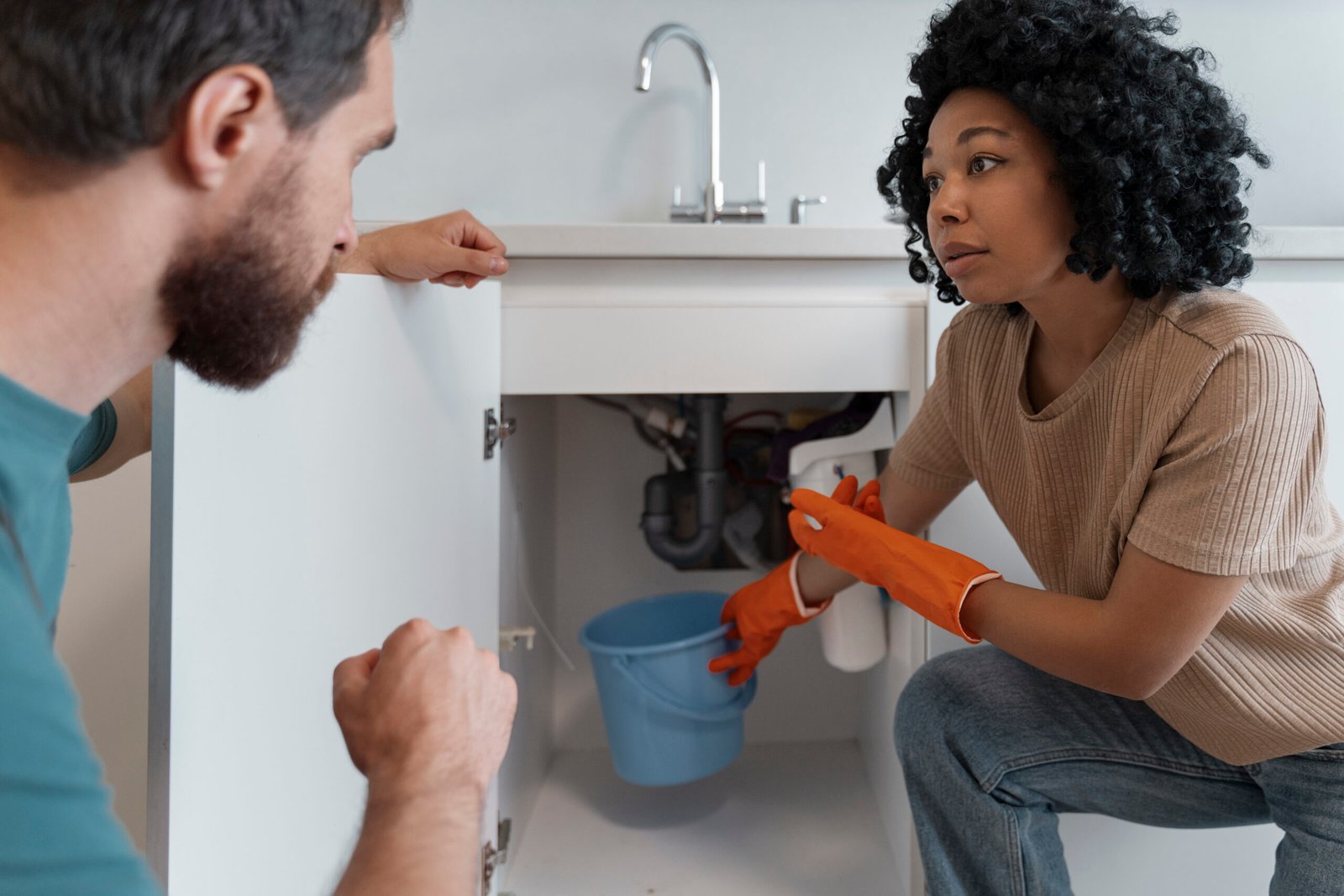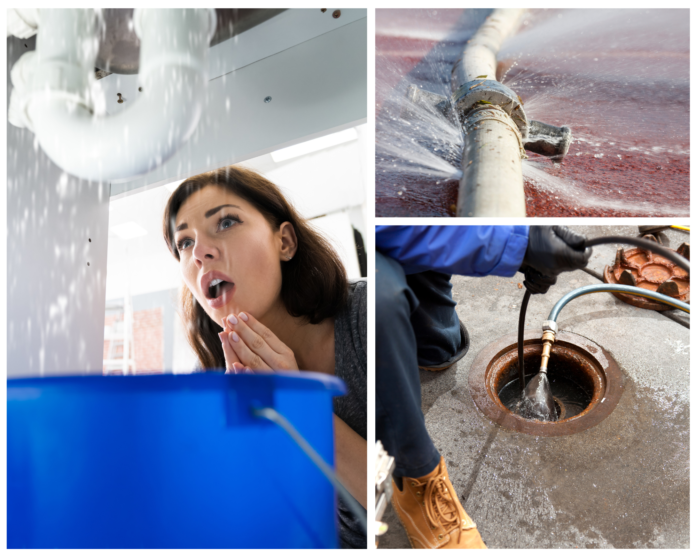Have you ever woken up to the sound of water gushing where it shouldn’t be? Or perhaps you’ve experienced the frustration of a toilet that refuses to flush during a dinner party? These scenarios are more than just inconveniences; they’re potential red flags signaling the need for immediate professional attention. But how do you know when a plumbing issue crosses the line from a minor nuisance to a full-blown emergency?
In the world of home maintenance, few things can escalate as quickly and catastrophically as plumbing problems. A small leak can transform into a flood, a clogged drain can lead to sewage backup, and a faulty water heater can leave you shivering in the cold. These situations not only disrupt your daily life but can also cause extensive damage to your home, potentially costing thousands in repairs if not addressed promptly.
This blog post delves into the top 10 signs that indicate you need an emergency plumber. We’ll explore the critical role that these skilled professionals play in safeguarding your home against water damage, health hazards, and structural issues. By understanding these warning signs, you’ll be better equipped to make timely decisions that could save you significant stress and expense. From sudden floods to mysterious odors, we’ll cover the gamut of plumbing red flags, providing you with the knowledge to distinguish between a DIY fix and a situation that demands expert intervention. So, let’s dive into the world of emergency plumbing and learn when it’s time to make that urgent call.
Table of Contents
Water, Water Everywhere: Dealing with Sudden Floods
Picture this: you step into your basement only to find yourself ankle-deep in water. Or perhaps you’ve noticed a steadily growing damp patch on your ceiling. These scenarios are clear indicators of a plumbing emergency that requires immediate attention. Sudden floods in your home can stem from various sources, such as burst pipes, major leaks, or even severe weather conditions that overwhelm your home’s drainage system.
The first sign of a sudden flood is often obvious – visible water where it shouldn’t be. This could manifest as puddles on the floor, water trickling down walls, or a ceiling that’s sagging under the weight of accumulated water. In some cases, you might hear the sound of running water even when all taps are turned off, indicating a hidden leak that’s rapidly worsening.
While waiting for an emergency plumber to arrive, there are immediate steps you can take to mitigate damage. First, if possible, shut off the main water supply to your home. This can help prevent further water accumulation. Next, try to remove valuable items from the affected area and use towels or buckets to contain the spread of water. However, be cautious of electrical hazards in flooded areas. The long-term consequences of water damage can be severe, including structural weakening, mold growth, and damage to electrical systems, making professional intervention crucial.

The Silent Menace: Detecting Hidden Leaks
Not all plumbing emergencies announce themselves with a dramatic flood. Some of the most insidious issues lurk unseen, slowly causing damage over time. Hidden leaks can be particularly problematic because they often go unnoticed until significant damage has already occurred. One of the first signs of a hidden leak might be an unexplained increase in your water bills. If you notice your water usage has spiked without any change in your household habits, it’s time to investigate.
Another telltale sign of hidden leaks is the appearance of damp spots on walls, ceilings, or floors. These may start as small, barely noticeable discolorations but can quickly expand if the underlying issue isn’t addressed. Pay special attention to areas around pipes, under sinks, and in basements or crawl spaces where pipes are often located.
The dangers of hidden leaks extend beyond just water damage. Persistent moisture creates an ideal environment for mold growth, which can pose serious health risks to you and your family. Additionally, prolonged exposure to water can weaken your home’s structural integrity, potentially leading to costly repairs down the line. If you suspect a hidden leak, it’s crucial to call an emergency plumber who can use specialized equipment to detect and locate the source of the problem before it escalates.
When Your Toilet Becomes a Fountain: Severe Blockages and Overflows
When your toilet starts overflowing or refuses to flush, it’s often a sign of a severe blockage in your plumbing system. These blockages can occur due to various reasons, including the flushing of non-biodegradable items, tree root intrusion into pipes, or a buildup of mineral deposits in older plumbing systems.
The most obvious sign of a toilet emergency is water overflowing from the bowl or backing up into other drains in your home. This situation not only creates an unsanitary mess but also poses significant health risks. Sewage backups can introduce harmful bacteria and pathogens into your living space, necessitating immediate professional intervention.
While it might be tempting to try and resolve the issue yourself with a plunger or store-bought chemical solutions, severe blockages often require specialized equipment and expertise. Attempting DIY fixes on major blockages can sometimes exacerbate the problem, potentially causing damage to your pipes or pushing the blockage further down the line. An emergency plumber has the tools and knowledge to safely clear the blockage and assess whether there are any underlying issues in your plumbing system that need to be addressed to prevent future occurrences.
The Big Chill: No Hot Water in Winter
Imagine stepping into the shower on a frosty morning, only to be greeted by an icy blast of cold water. The loss of hot water, especially during winter months, is more than just an inconvenience – it can significantly disrupt your daily routine and comfort. This situation often indicates a failure in your hot water system, which can range from simple issues like a blown fuse to more complex problems like a faulty heating element or a leak in the tank.
Common hot water system failures include thermostat malfunctions, sediment buildup in the tank, or issues with the heating element in electric systems. For gas water heaters, problems might involve the pilot light or gas supply. In some cases, a complete breakdown of an old water heater might necessitate a replacement.
When faced with no hot water, it’s important to consider energy efficiency when looking at repair or replacement options. Modern water heaters often offer significant improvements in energy consumption, which can lead to long-term savings on utility bills. While waiting for professional help, temporary solutions might include using an immersion heater for small quantities of hot water or, in dire situations, heating water on the stove. However, these are stop-gap measures, and the expertise of an emergency plumber is crucial for a proper diagnosis and long-term solution to ensure you have a reliable supply of hot water.
Gurgling Drains and Foul Odours: Sewer Line Problems
If you’ve noticed gurgling sounds coming from your drains or persistent foul odors wafting through your home, you might be dealing with sewer line problems. These issues are not just unpleasant; they can indicate serious problems in your plumbing system that require immediate attention. Sewer line issues can stem from various causes, including tree root intrusion, pipe collapse, or severe blockages.
Identifying sewer line problems early is crucial. Besides gurgling sounds and bad smells, you might notice slow draining across multiple fixtures, water backing up in strange places (like water appearing in your bathtub when you flush the toilet), or wet, foul-smelling patches in your yard. These signs suggest that wastewater is not flowing properly through your sewer system.
The environmental impact of sewer leaks cannot be overstated. Raw sewage can contaminate groundwater and soil, posing health risks to your family and neighbors. Modern techniques for sewer line repair, such as trenchless technology, allow plumbers to address these issues with minimal disruption to your property.
Pressure Problems: When Taps Run Dry or Pipes Start Singing
Water pressure issues in your home can manifest in two extremes: either your taps barely trickle or your pipes vibrate and sing with excessive pressure. Both scenarios warrant immediate attention from an emergency plumber. Low water pressure can be frustrating and impact the functionality of various appliances and fixtures in your home. On the other hand, excessively high pressure can strain your plumbing system, potentially leading to leaks or burst pipes.
Sudden changes in water pressure can have various causes. Low pressure might result from leaks in your plumbing system, issues with the municipal water supply, or clogged pipes. High pressure could be due to faulty pressure regulators or problems with your home’s water supply line. In some cases, the issue might be localized to a specific area of your home, indicating a problem with particular pipes or fixtures.
The impact of pressure problems extends beyond just inconvenience. Appliances like washing machines and dishwashers rely on proper water pressure to function effectively. Excessive pressure can damage these appliances and wear out plumbing fixtures prematurely. Conversely, low pressure can render them ineffective. Balancing water pressure throughout your home is a complex task that often requires professional assessment and intervention. An emergency plumber can diagnose the root cause of pressure issues and implement solutions that ensure consistent, safe water pressure throughout your home.
Conclusion
As we’ve explored the top 10 signs that warrant calling an emergency plumber, it becomes clear that vigilance and prompt action are key to maintaining a healthy plumbing system. From sudden floods to silent leaks, from sewer line issues to water pressure problems, each of these signs points to potentially serious underlying issues that require professional attention.
The value of prompt professional intervention cannot be overstated. What might seem like a minor inconvenience today could escalate into a major, costly disaster tomorrow. Emergency plumbers bring not just their skills and tools, but also their experience in quickly diagnosing and efficiently resolving complex plumbing issues. Their expertise can be the difference between a quick fix and extensive property damage.
As homeowners, it’s crucial to prioritize plumbing health in our overall home maintenance strategy. Regular inspections, timely repairs, and awareness of the warning signs we’ve discussed can save you significant stress, time, and money in the long run. Remember, your home’s plumbing system is like the circulatory system of a living organism – when it’s healthy, it operates smoothly in the background, but when problems arise, they can affect every aspect of your daily life.
In conclusion, while DIY efforts have their place in home maintenance, recognizing when to call in the professionals is a vital skill for any homeowner. By staying alert to these top 10 signs and acting swiftly when they appear, you’re not just solving immediate problems – you’re investing in the long-term health and value of your home. Don’t hesitate to reach out to a qualified emergency plumber when you notice these signs. After all, when it comes to plumbing emergencies, it’s always better to be safe than sorry.








